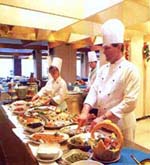Olympians survive in foodie heaven
After four courses and as many wines at the home of the Slow Food movement, up came a plate of unctuous, sweet panna cotta.

Faced with a dessert that translates as "cooked cream," the Olympic visitor could only think of the words of Manuela di Centa, a multiple gold medalist and mayor of the Olympic Village: "With measure" she had warned when discussing food in Piedmont. "Remember with measure."
Hundreds of athletes conditioned to be at their physical peak over the next two weeks are converging on this region famous for the good things in life rich cheeses, even richer Barolo wines and, and such sweet desserts as snowy-white panna cotta.
Di Centa knows only too well that carrying a few hundreds extra grams could mean the difference between gold and silver in cross country skiing.
"I remember one time when I said 'OK, I have to lose half a kilogram (a pound) more,"' she said.
But giving up her beloved cakes was not the way to do it instead, she would set off for 50 kilometers (30 miles) of cross country training over the trails of northern Italy.
And if she wanted an extra slice of cake, she just added extra kilometers to her regime.
"I had to say to myself, 'Manuela, you've done a great job because you skied well, it was cold and your technique was perfect. So now you can eat a piece of cake, it doesn't matter how many calories, how much fat,"' she said.
It didn't hurt. In her long career Di Centa won two cross country Olympic gold medals and seven overall.
Teams know well enough that healthy athletes in their twenties will not always have the discipline to eat exactly what they need and often overindulge on fats and sugar.
Norway's speedskating coach Peter Mueller agrees with Di Centa that more food can be worked off with more training.
"They basically eat what they want," the American said of his athletes.
"I'd rather be spending my time training than spending three or four hours a day listening to some nutritionist," he said.
Shaking his head, he remembers that, as a coach for the Dutch team, he had to explain how many potatoes each of his skaters ate a day.
"You can drink milk and go to bed at 6 p.m. but if you're not fit you are not going to skate fast," he said. "If you are fit and in form you can have a couple of beers and go to bed at 1 a.m."
Keeping check on potatoes, that staple of the Russian diet, was important to speed skater Svetlana Zhurova though.
After motherhood, she had ballooned to 82 kilograms (181 pounds), almost 20 kilograms (44 pounds) off her competition weight of 64 kilograms (141 pounds). She only had six months to get back in shape and ready for the Olympics.
It called for a special diet.
"I didn't eat after six (p.m.) and I didn't eat potatoes," she said.
It worked. Last month, she surprised everyone, winning the world sprint championship in the Netherlands and moving toward Turin as a gold medal favorite.
The Dutch have been working on food technology for years and even produced their own recovery drink. "An improvement in results is linked to an improvement in eating behavior," said the team's medical expert Tjeerd de Vries.
It's not a quick process though. When asked how long distance skaters have to manage their diets to get the right results in Turin, he replied: "years, really."
Ahead of the Olympics, few aspiring speed skaters will dine at the L'Osteria del Boccondivino in Bra, a village some 30 kilometers (20 miles) from Turin, where a rich dish of pasta all'uovo could be followed by braised rabbit, and barbera wine followed by barbaresco.
It is where the Slow Food movement its symbol a snail was born. Its reliance on the gentle pace of seasons and natural products stands juxtaposed to the frenetic pace of the Olympics and the vitamin supplements many athletes thrive on.
Not surprisingly, Slow Food is not part of the Olympic village, even though its gastronomic antithesis, McDonald's, is.
The American fast food chain however, already earned its Olympic laurels in Athens.
Australian Ryan Bayley won cycling gold two years ago boosted by a lunch of "Macca's," Australian slang for McDonald's.
"Most people do their own thing and eat the right things. I just eat whatever I want," he said, reports AP.
O.Ch.
Subscribe to Pravda.Ru Telegram channel, Facebook, RSS!


